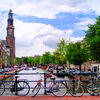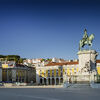10 Nights | Europe
You will visit the following 8 places:

Ostend
Ostend is a Belgian city and municipality located in the Flemish province of West Flanders. It comprises the boroughs of Mariakerke, Stene and Zandvoorde, and the city of Ostend proper – the largest on the Belgian coast. $$https://www.youtube.com/watch?v=jQrKuSi8B08$$

The Convent Amsterdam
Amsterdam is the capital of the Kingdom of the Netherlands. It is the country's largest city and its financial, cultural, and creative centre. Many large Dutch institutions have their headquarters there, and seven of the world's 500 largest companies, including Philips and ING, are based in the city. In 2012, Amsterdam was ranked the second best city in which to live by the Economist Intelligence Unit (EIU) and 12th globally on quality of living for environment and infrastructure by Mercer. Amsterdam derives its name from the city’s origin as “Dam” of river “Amstel”. In the past, the name was "Amstelredamme" which later changed as “Amsterdam”. The city is one of the most popular destinations in Europe, attracting over 7 million international travellers annually. The city is colloquially known as ''Venice of the North'' because of its lovely canals that criss-cross the city, its impressive architecture and more than 1,500 bridges. There is something for every traveller's taste here; whether you prefer culture and history, serious partying, or just the relaxing charm of an old European city!

Lisbon
The capital of Portugal, Lisbon (Portuguese: Lisboa) has experienced a renaissance in recent years, with a contemporary culture that is alive and thriving and making its mark in today's Europe. Perched on the edge of the Atlantic Ocean, Lisbon is one of the rare Western European cities that faces the ocean and uses water as an element that defines the city. Lisbon enchants travellers with its white-bleached limestone buildings, intimate alleyways, and an easy-going charm that makes it a popular year-round destination.

Porto
Porto (also known as Oporto in English), is the second largest city in Portugal after Lisbon and one of the major urban areas of the Iberian Peninsula. The urban area of Porto, which extends beyond the administrative limits of the city, has a population of 1.4 million (2011) in an area of 389 km2 (150 sq mi), making it the second-largest urban area in Portugal. Located along the Douro river estuary in Northern Portugal, Porto is one of the oldest European centres, and its historical core was proclaimed a World Heritage Site by UNESCO in 1996. The western part of its urban area extends to the coastline of the Atlantic Ocean. Its settlement dates back many centuries, when it was an outpost of the Roman Empire. One of Portugal's internationally famous exports, port wine, is named for Porto, since the metropolitan area, and in particular the caves of Vila Nova de Gaia, were responsible for the packaging, transport and export of the fortified wine. In 2014, Porto was elected The Best European Destination by the Best European Destinations Agency.

London Borough of Greenwich

Honfleur
Honfleur is a commune in the Calvados department in northwestern France. It is located on the southern bank of the estuary of the Seine across from le Havre and very close to the exit of the Pont de Normandie. The most picturesque of the Côte Fleurie's seaside towns, its inhabitants are called Honfleurais. It is especially known for its old, beautiful picturesque port, characterized by its houses with slate-covered frontages, painted many times by artists, including in particular Gustave Courbet, Eugène Boudin, Claude Monet and Johan Jongkind, forming theécole de Honfleur (Honfleur school) which contributed to the appearance of the Impressionist movement. The Sainte-Catherine church, which has a bell tower separate from the principal building, is the largest church made out of wood in France.

St. Peter Port

Cherbourg-Octeville
Cherbourg-Octeville is a city and former commune situated at the northern end of the Cotentin peninsula in the northwestern French department of Manche. Due to its union, it is the most populated city in its department with 37,121 inhabitants making it the first city of the department before the Saint-Lô prefecture and the second in the region after Caen. Cherbourg-en-Cotentin is protected by Cherbourg Harbour, between La Hague and Val de Saire, and the city has been a strategic position over the centuries, disputed between the English and French. Cited as one of the "keys to the kingdom" by Vauban, it became, by colossal maritime development work, a first-rate military port under the leadership of Louis XVI and Napoleon, and holds an arsenal of the French Navy. A stopping point for prestigious transatlantic liners in the first half of the 20th century, Cherbourg was the primary goal of US troops during the invasion of Normandy in 1944. Along with its use as a military, fishing and yachting port, it is also a cross-Channel ferry port, with routes to the English ports of Poole and Portsmouth, the Irish port of Rosslare Harbour and St Helier on Jersey. Limited by its geographical isolation from being a great commercial port, it is nonetheless an important shipbuilding centre, and a working-class city with a rural hinterland.








